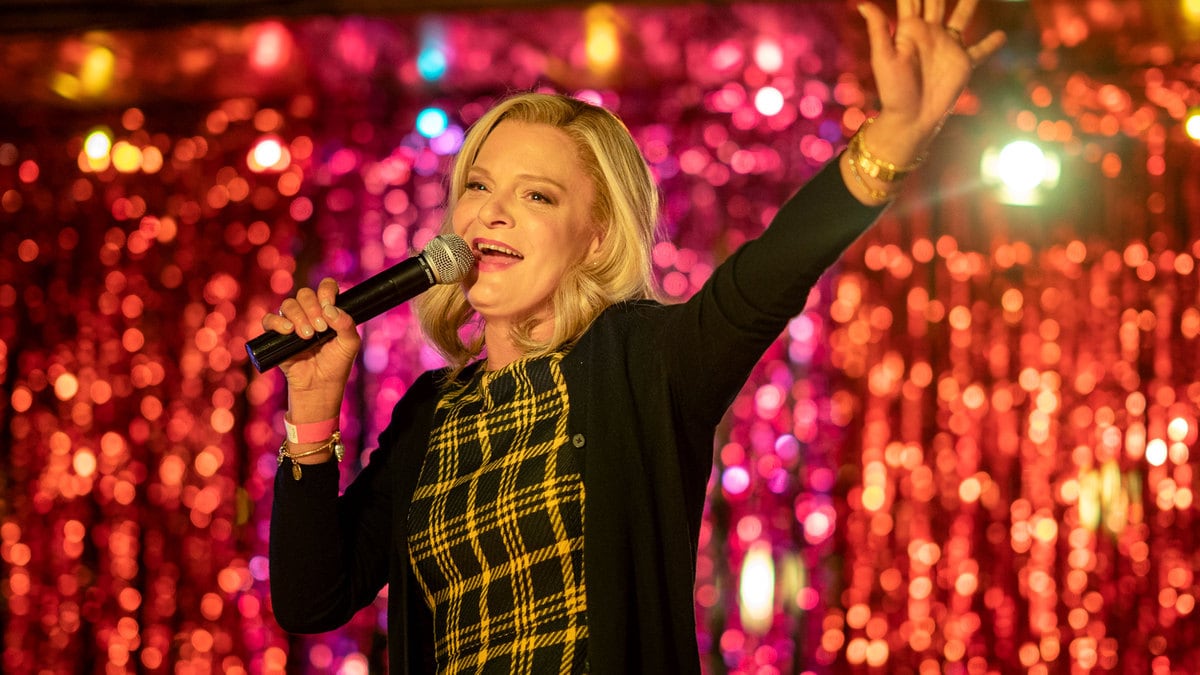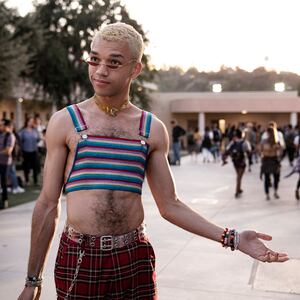In TV and movies that feature a teen coming out story, we’ve gotten used to seeing certain kinds of moms.
There are the ones who, like, Jennifer Garner’s character in Love, Simon, are the platonic ideal, who know the exact right thing to say about acceptance, delivering a beautiful monologue that any gay teenager would hope to hear from after coming out. The phrase “you get to exhale now” has become a cathartic trigger thanks to Garner’s compassionate delivery in that film’s scene—instant tears.
Then there are the types of mothers and parents that may be even more common, especially given the entertainment industry’s preoccupation with centering queer teen and coming out stories around pain and ostracization. These are the parents who refuse to accept their children, who disown them. The ones who invoke religion, Bible, and lifetimes of ingrained morality lessons while refusing to validate their children for who they are and who they love.
But as more content about the lives of LGBT+ people and coming out is being produced from more diverse voices, the reality of that journey is being told on a more nuanced and complicated spectrum. No longer do we have to assign one character’s narrative to an entire community’s varied experiences. And there’s been an interesting, maybe even unexpected byproduct of this breadth of storytelling: Those “mother” characters have become more complicated, too.
On HBO Max’s Genera+ion, Emmy-winner Martha Plimpton plays Megan, mother to twin teens. One of them, Uly Schlesinger’s Nathan, very publicly (and, for Megan, humiliatingly) comes out as bisexual.
Megan is a familiar type. She’s tightly wound, a spring that could burst at any moment as she circles her California suburb McMansion’s expansive kitchen island, filling out the family’s calendar of activities and barking out a steady stream of plans and logistics. Her blown-out hair, cardigan, and pearls move comfortably from church services to backyard margaritas with the gay couple she’s been friends with since high school, pleased that their connection signals publicly that she’s, perhaps, a “cool” conservative. When it’s her own son that needs that embrace, however, it’s another story.
That Genera+ion features a groundbreaking array of young queer teens is owed to the fact that Zelda Barnz, who co-created the show with her father, Daniel, was only 17 when she wrote the pilot script. There’s no shortage of fascinating characters. In a recent interview with The Daily Beast, Plimpton ruled that Justice Smith’s crop top-wearing, loud-and-proud, bleeding-heart Chester is not just her favorite character on the series, “but in life,” adding, “I love how flamboyant and flip he is, but also how seriously he takes everything. It really moves me.”
People tuning into the queer-positive show may not have expected for Plimpton’s Megan—whose struggle to accept Nathan is one of the series’ recurring threads—to be a favorite character. But the complicated layers woven into each exchange mother and son have—or, more accurately, endure—end up producing some of the series’ most gratifying and fascinating moments.
A climax of that arc came in the most recent episode, titled “There’s Something About Hamburger Mary’s.” The episode ends with Megan begrudgingly attending a LGBT fundraiser on what seems to be Nathan’s dare. Then she is tricked into singing a karaoke performance of Des’ree’s ’90s hit “You Gotta Be” that ends with her in tears.
“I thought it was really sad and I thought it was really sort of cringey,” Plimpton says when we connect to talk about the episode. “I thought it was all the things that you love to be able to play that make a character like Megan complex and interesting.”
The heartbreaking karaoke debacle closes out the episode, with Plimpton’s voice cracking with each new lyric as the scene fades to end credits. But it all starts with Nathan leveling up his arms race with Megan over his sexuality. She’s certain that it’s a choice, that he can be talked out of it, and that he’s just acting out and testing her. To some extent, she’s correct. He keeps orchestrating stunts to shove his sexuality in her face to shock and shame her. But it is his sexuality, and it’s causing trauma that she’s not accepting it.
Her last nerve practically explodes all over that kitchen island when Nathan cancels their mother-son date night because of the LGBT fundraiser. When she’s pissed, he challenges her to come, assuming that she’d never do it. It’s Megan’s husband, Mark, who convinces her to attend, coaching her, “If you want to steer the boat, you have to be in it.”
“That’s a very, very smart way of getting through to Megan,” Plimpton says. “Because he's not saying, ‘You have to be in the boat to enjoy the boat.’ He's saying, ‘In order to control things, you have to be there. You can’t control it if you’re not there.’ That’s kind of where Megan is at. And she very quickly discovers she’s not in control of anything. Anything.”
When the fundraiser at drag queen bar Hamburger Mary’s becomes a love-fest appreciation for all the parents who support their queer children, Megan realizes she can’t be there, even begrudgingly. “It is not good parenting to walk your child into a volcano, and here we are laughing and holding his hand and walking him straight into hell,” she hisses at Mark as she tries to storm out.
But Nathan’s dare didn’t just end with the invite. He also signed Megan up for karaoke, unbeknownst her. Tortured panic flickers across her face as she makes her way to the stage. Mother and son are engaged in a cat-and-mouse game in which there are no winners, but Megan is not going to give Nathan the satisfaction of walking away.
“There's a part of every parent that goes, 'Oh really, you think you know me, kid? You know, I'm a lot more interesting than you realize,’” Plimpton says. “I think that's what she's saying. She's accepting the dare.”
There’s a moment during the karaoke performance where you may expect things to turn around, like they do in other, more uplifting portrayals of coming out stories. You may expect Megan’s nerves and disgust to transform into a triumphant performance that signals her acceptance. Instead, it quickly morphs into an uncomfortable meltdown, the kind of which even Nathan is pained to watch from the audience.
“Life is so messy and relationships between parents and their children are messy anyway, and teenagers are crazy anyway,” Plimpton says. “Teenagers are crazy and now also smarter than us.”
“I think there's very little in the show that is the simple kind of Hallmark or sitcom version of events,” she continues. “The sitcom version of my answer for this would be that she's getting up there to prove to Nathan that she loves him and she accepts him. But no, that ain't happening. And there's a long way to go before that happens. But that doesn't mean that she doesn't really, really love him and really, really want to make sense of this.”
That’s what makes this relationship so different from what we’re used to seeing, even on a sitcom like The Real O’Neals, on which Plimpton played the Catholic mother of a teenage gay son. She’s not accepting of Nathan’s sexuality. But she’s not casting him out either. In fact, she refuses to let him go. For all of her negativity and suffocation, it’s very clear that she still loves him and will continue to love him, somehow. On a spectrum from sweet to toxic, she falls much closer to the latter. But the sweetness is there.
“I think it’s something a lot of queer kids understand and have experienced, which is a parent who just doesn't like chaos,” Plimpton says. “She just doesn’t like that there is a world in which there’s some unknown. There’s nothing unknown in this world that can’t be explained by religion, which sets up a very clear system of rules and parameters. And those are the people who are really terrified.”
That Megan can accept her gay friends and Nathan’s queer classmates but not her own son isn’t hypocrisy, at least not in her eyes. “Love the sinner, not the sin. When it applies to your friends, you know that your friend is going to hell but there’s nothing you can do about it. So you've got to, if not respect their choice, accept as you see it: their choice. But with your son? No. That’s a bridge too far. That’s your family and you need to do something about it.”
Working on Genera+ion and, more, just watching the show as an avid viewer, Plimpton says she’s developed “just an enormous amount of love for these kids for their openness and their honesty with one another and their youthful, desperate attempts at connection.”
And, in a welcome turn of events given the trajectory we’ve seemed to have been on these last few years, they also give her hope. “They make me not feel as afraid for humanity as I am when I'm looking at these lunatic, older people who want to keep them out of sports and keep them out of the world and hide them away,” she says. “I’m very moved by their insistence on not being ignored and not being isolated like that.”
As for Megan, she cautions not to look at the big karaoke moment as a seismic shift in her relationship with Nathan, or as a profound moment of realization. It certainly is versions of those things, in ways that Megan is probably still processing. But like so many things in Genera+ion, there are no easy answers or neat punctuation put on things.
“It’s more like she’s on a train that’s going,” she says. “She’s on a runaway train. And this is the next stop that she’s gonna miss.”


